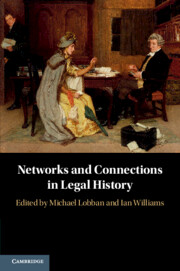Book contents
- Networks and Connections in Legal History
- Networks and Connections in Legal History
- Copyright page
- Contents
- Contributors
- 1 Introduction
- 2 Networks and Influences
- 3 Men of Law and Legal Networks in Aberdeen, Principally in 1600–1650
- 4 Calling Time at the Bar
- 5 The Thistle, the Rose, and the Palm
- 6 ‘The Bengal Boiler’
- 7 The White Ensign on Land
- 8 A Broker’s Advice
- 9 Trans-Atlantic Connections
- 10 Interpretatio ex aequo et bono
- 11 Shakespeare and the European ius commune
- 12 Law Reporting and Law-Making
- 13 John Taylor Coleridge and English Criminal Law
- Index
8 - A Broker’s Advice
Credit Networks and Mortgage Risk in the Eighteenth-Century Empire
Published online by Cambridge University Press: 10 August 2020
- Networks and Connections in Legal History
- Networks and Connections in Legal History
- Copyright page
- Contents
- Contributors
- 1 Introduction
- 2 Networks and Influences
- 3 Men of Law and Legal Networks in Aberdeen, Principally in 1600–1650
- 4 Calling Time at the Bar
- 5 The Thistle, the Rose, and the Palm
- 6 ‘The Bengal Boiler’
- 7 The White Ensign on Land
- 8 A Broker’s Advice
- 9 Trans-Atlantic Connections
- 10 Interpretatio ex aequo et bono
- 11 Shakespeare and the European ius commune
- 12 Law Reporting and Law-Making
- 13 John Taylor Coleridge and English Criminal Law
- Index
Summary
This chapter analyzes the development of the mortgage among the new market practices, and new financial instruments, that were critical to the growth of the “empire of credit” stretching across the eighteenth-century Atlantic. The mortgage was an especially important part of this new credit economy because it lay at the nexus between landed and commercial wealth, and played a generative role in financing improvement and diversification. It is not surprising, then, that mortgage law, as a critical component of finance and credit relations, saw real development in this same period. This essay compares and connects the work of brokers, lawyers, and judges who constructed and evaluated mortgage deals, and examines the transmission and testing of the doctrine of the equity of redemption. Particular attention is paid to challenges to the operation of mortgage doctrine in Ireland, and other parts of the British empire, and what these signify for the broader history of legal and economic development in the eighteenth century.
- Type
- Chapter
- Information
- Networks and Connections in Legal History , pp. 185 - 209Publisher: Cambridge University PressPrint publication year: 2020
- 1
- Cited by

